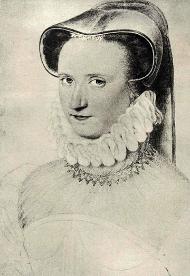ใครออกเดทกับ Françoise Babou de La Bourdaisière?
Louis de Bérenger วันที่ Françoise Babou de La Bourdaisière จาก ? ถึง ?.
พระเจ้าอ็องรีที่ 3 แห่งฝรั่งเศส วันที่ Françoise Babou de La Bourdaisière จาก ? ถึง ?.
Françoise Babou de La Bourdaisière

Françoise Babou de La Bourdaisière, Marquise of Coeuvres, vicomtess of Soissons and of Bercy (French pronunciation: [fʁɑ̃swaz babu də la buʁdezjɛʁ]; 1542 – 9 June 1592) was the mistress of a favourite of the king, Du Guast. She married Antoine d'Estrées in 1558, and they were the parents of Gabrielle d'Estrées—mistress of King Henry IV of France.
อ่านเพิ่มเติม...Louis de Bérenger

Louis de Bérenger, sieur du Guast (c. 1540– 31 October 1575) was a French noble and early favourite of king Henri III during the French Wars of Religion. Having fought in the latter Italian Wars under Marshal Brissac he achieved prominence in court in 1569, when he was subject to the attentions of the acclaimed poet Ronsard. The following year he was elevated to a gentleman of the chamber in the entourage of the King's brother. It was with the king's brother that he participated in the assassinations that prefigured the Massacre of Saint Bartholomew. In the civil war that followed he would command a company of infantry during the siege of La Rochelle, during which he received a severe wound to his arm in an assault.
With his patron Anjou's election as king of the Commonwealth, Du Guast travelled with his lord to the east. While in the country during Anjou's brief rule he found himself overshadowed by Bellegarde, Anjou's new closest favourite, finding himself forced to compete with Bellegarde for the position of Colonel-General of the infantry. News of the king's death in France, caused Anjou to flee the Commonwealth to take the 'more valuable' throne. Du Guast travelled back with him and spent time with the now king Henri III during his walks in Lyon. Du Guast was granted a large monetary gift from the king in early 1575 and superseded Philippe Strozzi as commander of the French guard. Du Guast at this point found himself frustrated with the king's sister Marguerite de Valois, who had rebuffed his advances. Resultingly he informed the king of her affair with the seigneur de Bussy, chief among the king's brothers' favourites. Henri instructed Du Guast to kill Bussy, and he arranged an attempt while Bussy was departing from the Louvre. Du Guast and twelve other men jumped on him, but Bussy was able to evade their attacks, swearing vengeance for the attempt. Du Guast was now tasked with ensuring that the king's brother did not escape court to set himself up with the rebels in the provinces as their leader. Du Guast recommended to the king locking Alençon in the Bastille but the king refused. After Alençon's escape the civil war began to look up for the king, with the Duke of Guise's victory at the Battle of Dormans. Du Guast warned the king of the risks of allowing the duke to overshadow his achievements, and persuaded the king to not seek peace and keep fighting for victory so he could surpass Guise in achievement. On 31 October 1575 Du Guast was assassinated in his home by a group of men led by Vitteaux, a client of Alençon's.
อ่านเพิ่มเติม...Françoise Babou de La Bourdaisière

พระเจ้าอ็องรีที่ 3 แห่งฝรั่งเศส

พระเจ้าอ็องรีที่ 3 แห่งฝรั่งเศส (ฝรั่งเศส: Henri III, né Alexandre Édouard; โปแลนด์: Henryk Walezy; ลิทัวเนีย: Henrikas Valua; 19 กันยายน ค.ศ. 1551 - 2 สิงหาคม ค.ศ. 1589) ทรงเป็นพระมหากษัตริย์แห่งฝรั่งเศส ตั้งแต่ ค.ศ. 1574 จนกระทั่งพระองค์ถูกลอบปลงพระชนม์ใน ค.ศ. 1589 รวมทั้งทรงเป็นพระมหากษัตริย์แห่งโปแลนด์และแกรนด์ดยุกแห่งลิทัวเนีย ตั้งแต่ ค.ศ. 1573 ถึง ค.ศ. 1575
พระองค์ทรงเป็นพระราชโอรสองค์ที่ 4 ของพระเจ้าอ็องรีที่ 2 แห่งฝรั่งเศส พระองค์ไม่ได้คาดคิดว่าจะได้สืบราชบังลังก์แห่งฝรั่งเศสและด้วยเหตุนี้ ทรงเป็นผู้ท้าชิงที่ดีสำหรับราชบังลังก์ที่ว่างเปล่าของเครือจักรภพโปแลนด์-ลิทัวเนีย ที่ซึ่งพระองค์ทรงถูกเลือกให้เป็นพระมหากษัตริย์ใน ค.ศ. 1573 ในช่วงที่ทรงปกครองในระยะสั้น พระองค์ทรงลงพระนามใน Henrician Articles เพื่อให้กลายเป็นกฏหมาย ซึ่งเป็นการยอมรับถึงสิทธิ์ของขุนนางโปแลนด์ในการเลือกพระมหากษัตริย์ของพวกเขาอย่างเสรี เมื่อทรงมีพระชนมายุ 22 ปี พระเจ้าอ็องรีทรงสละราชบังลังก์แห่งโปแลนด์ เพื่อสืบราชบังลังก์แห่งฝรั่งเศส เมื่อพระเจ้าชาร์ลที่ 9 แห่งฝรั่งเศส พระเชษฐาของพระองค์ ทรงสวรรคตโดบปราศจากข้อกังขาใด ๆ
ฝรั่งเศสอยู่ในช่วงเวลาแห่งความวุ่นวายโดยสงครามศาสนา และพระราชอำนาจของพระเจ้าอ็องรีถูกบ่อนทำลายโดยกลุ่มฝ่ายการเมืองที่รุนแรงโดยได้รับทุนสนับสนุนโดยมหาอำนาจต่างชาติ: สันนิบาตคาทอลิก(ได้รับสนับสนุนโดยสเปนและพระสันตะปาปา) อูว์เกอโนที่เป็นพวกนิกายโปรเตสแตนต์(ได้รับสนับสนุนโดยอังกฤษและดัตช์) และฝ่าย Malcontents (ซึ่งนำโดยดยุกแห่งอ็องฌูและอาล็องซง พระราชอนุชาของพระเจ้าอ็องรีเอง พรรคของชนชั้นสูงที่นับถือทั้งนิกายคาทอลิกและโปรเตสแตนต์ที่ร่วมมือกันต่อต้านความปราถนาอันแรงกล้าในพระราชอำนาจที่เด็ดขาด(สมบูรณาญาสิทธิราชย์) ของพระมหากษัตริย์) พระเจ้าอ็องรีทรงเป็น politique ด้วยพระองค์เอง โดยให้เหตุผลว่าสถาบันพระมหากษัตริย์ที่เข้มแข็งและให้การยอมรับความต่างทางศาสนาจะช่วยฝรั่งเศสให้รอดพ้นจากการล่มสลาย
ภายหลังจากการเสียชีวิตของฟร็องซัว ดยุกแห่งอ็องฌู พระอนุชาองค์เล็กของพระเจ้าอ็องรี และเมื่อปรากฏให้เห็นว่าพระเจ้าอ็องรีไม่สามารถมีรัชทายาทได้ สงครามศาสนาได้พัฒนาจนกลายเป็นวิกฤตสืบราชบังลังก์ สงครามสามอ็องรี ทายาทโดยชอบธรรมของพระเจ้าอ็องรีที่สามทรงเป็นพระญาติห่าง ๆ ของพระองค์ พระเจ้าอ็องรีที่ 3 พระมหากษัตริย์แห่งนาวาร์ ซึ่งนับถือนิกายโปรเตสแตนต์ สันนิบาตคาทอลิกที่นำโดยอ็องรีที่ 1 ดยุกแห่งกีซ ได้พยายามกีดกันฝ่ายนิกายโปรเตสแตนต์จากการสืบราชบังลังก์และให้การสนับสนุนแก่ชาร์ล พระคาร์ดินัลแห่งบูร์บงที่นับถือนิกายคาทอลิก ในฐานะทายาทของพระเจ้าอ็องรีที่สาม
ใน ค.ศ. 1589 Jacques Clément ผู้คลั่งศาสนาคาทอลิก ได้ทำการลอบปลงพระชนม์พระเจ้าอ็องรีที่สาม พระองค์ทรงได้รับการสืบทอดโดยพระมหากษัตริย์แห่งนาวาร์ มีพระนามว่า พระเจ้าอ็องรีที่ 4 ได้เข้าไปนั่งบนราชบังลังก์แห่งฝรั่งเศส ภายหลังจากทรงเปลี่ยนมานับถือนิกายคาทอลิก ในฐานะพระมหากษัตริย์แห่งฝรั่งเศสพระองค์แรกของราชวงศ์บูร์บง
อ่านเพิ่มเติม...